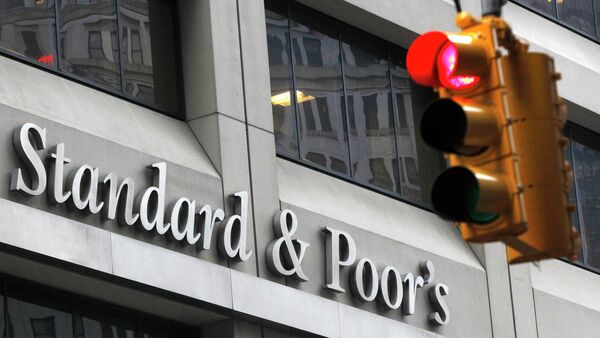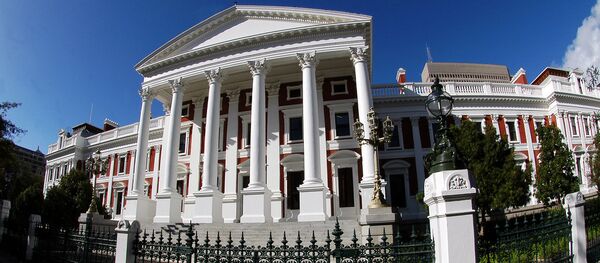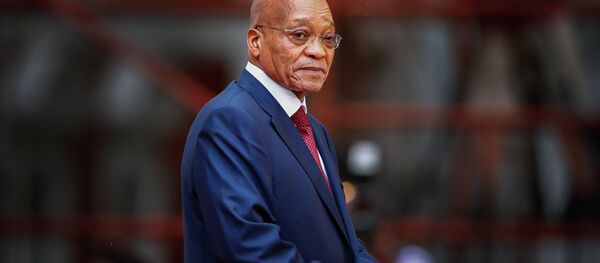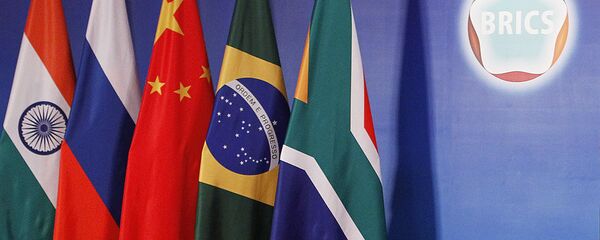Kristian Rouz – International credit rating agency S&P Global Ratings is likely to lower South Africa’s sovereign debt grade to 'junk' on Friday as the rand’s strength, a slump in commodity export revenues, a relatively high debt-to-GDP ratio, slowing growth, and overall lack of potential and willingness to reform are all undermining the nation’s ability to service its obligations.
After the financial turmoil and cabinet reshuffles earlier this year, which resulted in South Africa suffering massive capital outflow and a plunge in the rand’s FX rate, the nation is facing another challenge: the prospect loss of its international credit rating. Amid mounting complications in its economy, South Africa is still the world’s largest financial market among developing nations, with the Johannesburg Stock Exchange (JSE) boasting the highest trading volumes in its league. A credit rating downgrade would therefore affect the nation’s economic growth outlook, which is already bleak given the economy’s structural weakness.
“The real concern for an ordinary South African is what it is going to do for interest rates, what it is going to do for the exchange rate and what’s it going to do for investor confidence,” economist Dieter von Fintel of Stellenbosch University said.
Currently, Standard & Poor’s maintains South Africa’s credit rating at just one notch above junk level, outlook negative, and other international agencies such as Moody’s evaluate the nation’s creditworthiness at similar levels. The country stands to lose its barely-investment-grade rating due to a combination of multiple factors, all stemming from the ANC’s inability or unwillingness to adjust the economy to the shifts in the global landscape.
Even though the South African Reserve Bank (SARB) has maintained a rather tight monetary environment, with base borrowing costs standing at 10.5% and likely rising in the near-term, there is little potential for monetary easing that might spur growth. Given the scarcity of investment capital hindering growth already, easing measures could result in severe capital outflows, and a looming rating downgrade will force the SARB to hike rates further in an attempt to preserve the remains of the nation’s credit appeal.
Base interest rates will be “potentially even higher than what we otherwise would see were it not for the downgrade,” said Jana van Deventer, Head of Financial Markets at ETM Analytics in Johannesburg.
Rife political risks and growing opposition to President Jacob Zuma’s policies make a broader picture even more complicated. In late 2015-early 2016, Zuma initiated a cabinet reshuffle, with finance ministers coming and going, triggering the current capital outflows. The rand plunged, but lower currency costs weren't sufficient to jumpstart a growth-through-devaluation engine, as the battered precious-metal exports-supported currency has more potential for sustainability than most of its emerging market peers.
This is likely so.
Zuma reappointed Gordhan to the office in December, but only because of the high pressure that was placed on him by the interest groups representing the nation’s businesses. In February, Gordhan announced a policy of fiscal discipline, aiming at curbing the debt-to-GDP ratio at 50.5%. Even though this is not a strikingly huge number compared to that of Japan (400%), the national currency’s weakness makes it a big issue.
Meanwhile, the firmly left-wing Zuma is hardly ready to commit to fiscal discipline. The ANC’s political strategy of the past decades has been its reliance on getting votes via increased social benefits and wealth redistribution, which it has justified with rhetoric calling for the eradication of the injustice which stemmed from the legacy of Apartheid.
“It was calming for the markets that Gordhan was appointed, he is a safe pair of hands,” Jan Friederich of Fitch said. “But with the developments since then, we are not entirely sure that has completely reinstated the ‘status quo ante’ in terms of allaying the fears that there was a shift in sentiment on the side of the presidency towards fiscal consolidation.”
There is still a chance the S&P could postpone their rating downgrade for South Africa till later this year. Growth is weak, and political turmoil is high, meaning an immediate junking of South Africa might stir unpredictable political consequences. Yet, even if a downgrade is delayed, political struggle is bound to exacerbate in the coming months as left-wing economic experiments have proven insufficient in dealing with the complexity of challenges the nation is facing.





